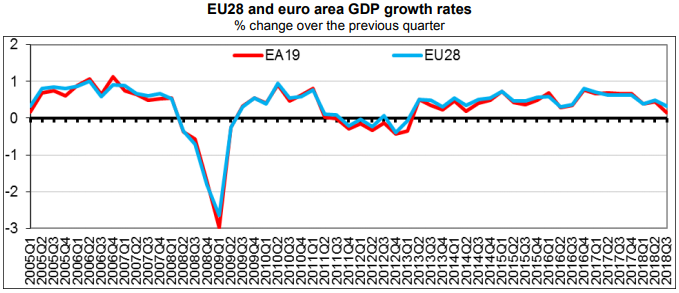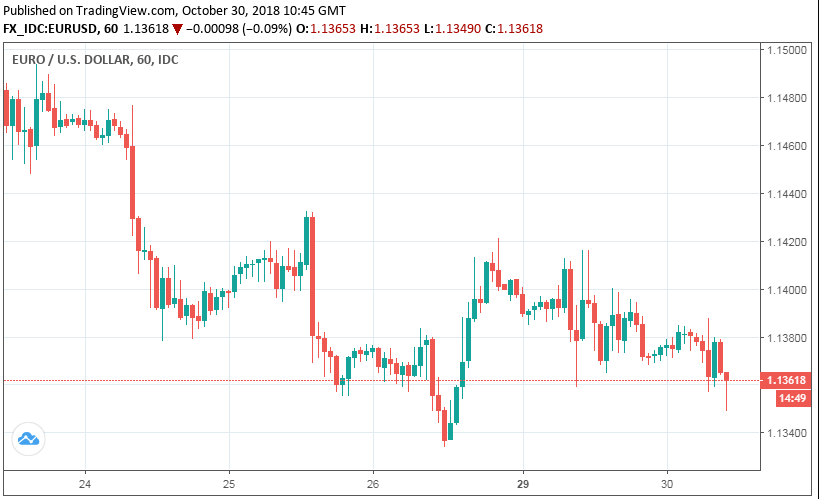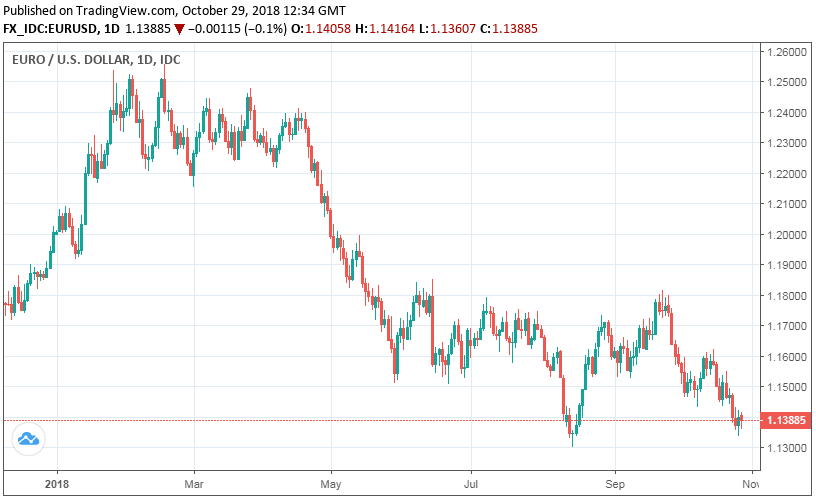Euro-to-Dollar Rate Outlook Darkens after Third-quarter GDP Growth Surprises on the Downside
- Written by: James Skinner

© kasto, Adobe Stock
- Eurozone GDP growth of 0.2% surprises on the downside.
- Growth slowed progressively in 2018, darkening EUR outlook.
- Data comes as economic and political headwinds are mounting.
The Euro slipped lower Tuesday after official data revealed a surprise slowdown in the pace of Eurozone GDP growth during the third-quarter, darkening the outlook for the single currency.
Eurozone GDP grew by just 0.2% during the third-quarter which, down from 0.3% previously, is beneath the consensus forecast for an increase of 0.4% and half the rate anticipated by the European Central Bank (ECB).
This means the economy expanded at an annualised pace of just 1.7% and confirms that Eurozone GDP growth has slowed progressively in 2018.
GDP grew by 2.7% in the final quarter of 2017 before the expansion slowed to 2.4% in the first quarter of 2018, and then 2.2% in the second quarter.
"Growth of 0.4% in the second quarter may have felt like a disappointment at the time, but could well have been a last hurrah of the growth cycle. Eurozone GDP growth in 3Q came in at just 0.2% and while one-off factors have influenced the number, it does not seem that growth will return to previous rates anytime soon," says Bert Colijn, a senior Eurozone economist at ING Group.

Above: Eurostat graphs showing EU and Eurozone GDP growth rates.
Earlier data from the Eurozone's second largest economy, France, already surprised on the downside Tuesday morning and tipped the market off about a possible disappointment in the Eurozone figure.
Last week the European Central Bank said the bloc's economic pulse has weakened of late but that the slowdown has not been sufficient enough for it to alter the outlook or the ECB's policy intentions.
However, Tuesday's data may have marked a watershed moment for the single currency and the region's prospects because the ECB had forecast a much faster rate of expansion.
"EUR/USD will continue to trade heavy in the near‑term because there is unlikely to be enough evidence to support a material upward adjustment to ECB interest rate expectations," says Joseph Capurso, a currency strategist at Commonwealth Bank of Australia.
Currency markets care about the GDP data because it reflects rising and falling demand within the Eurozone economy, which has a direct bearing on consumer price inflation, which is itself important for questions around interest rates.
The single currency's appeal to investors is hinged largely upon expectations the European Central Bank will end its quantitative easing programme this year and begin raising interest rate some time in 2019.
"We expect the ECB to stick to its plans to end asset purchases this year, but the recent run of weak data suggests that the Bank will stress that policy tightening will depend on the incoming figures," says Jessica Hinds, a European econonist at Capital Economics.
The ECB said last week it has been undeterred by downbeat economic data thus far but it remains to be seen if that tune will still hold water at the December meeting, after which the quantitative easing programme is meant to end.
Eurozone is slowing because inflation is rising and the international trade environment has deteriorated due to President Donald Trump's "trade war".
New European Union rules governing emissions testing of new cars have hit output from the automotive industry in recent months, and economists expect this also dealt a blow to the German economy too.
"With simmering uncertainty impacting investment, a high oil price curbing consumption growth somewhat and external factors affecting the exports outlook, we expect growth to come in at just 0.3% in 4Q. Not much of a recovery, given the sudden drop in growth in 3Q," says ING's Colijn.

Above: Euro-to-Dollar rate shown at hourly intervals.
The Euro-to-Dollar rate was quoted 0.19% lower at 1.1353 following the report, after extending an earlier 0.03% loss, and is now down by 5.4% for 2018.
The Euro-to-Pound rate was 0.17% higher at 0.8900, making for a Pound-to-Euro rate of 1.129, and has now risen 0.6% for 2018.

Above: Euro-to-Dollar rate shown at daily intervals.
"A bad miss on the headline GDP rate, but the consensus for an unchanged run-rate looked a bit odd given the poor trajectory of the hard data, especially in Germany. We don’t know yet what happened in the Eurozone’s largest economy in Q3, but we are fairly certain that volatility in manufacturing, around the new EU emissions tests in the car sector, was a big drag," says Claus Vistessen, chief Eurozone economist at Pantheon Macroeconomics.
German Chancellor Angela Merkel said Monday she will not seek re-election as the head of the Christian Democratic Union party in December or as Chancellor come the next national ballot. The decision followed a series of punishing defeats for the CDU in regional elections.
"The euro declined modestly against the dollar yesterday following another disappointing regional election result for the German government. Chancellor Merkel has since indicated that she will not seek re-election for the CDU Chair in December’s elections, nor the chancellery after her term ends in 2021," says Lee Hardman, a currency analyst at MUFG.
Hardman says both economic and political events in Germany will continue contributing to increasingly negative sentiment toward the Euro.
Political uncertainty hangs over Germany at a time when business confidence in the Eurozone's largest economy has entered into a downward spiral and concern about the outlook is rising.
Germany's Ifo Business Climate index, which measures optimism about the general business outlook across a group of some 7,000 German companies, reversed its summer gains and slipped lower for the month of October.
Activity in Germany's mighty manufacturing sector grew at its slowest rate for almost three and a half years in October, with the IHS Markit PMI falling from 53.7 in September to 52.3.
The German services PMI fell to a five-month low of 53.6, down from 55.9 in September, as activity growth also weakened rapidly.
"Concerns towards trade wars, the threat of tariffs, Brexit uncertainty and wider geopolitical worries all weighed on business confidence at the start of the fourth quarter. Expectations among firms towards the outlook for activity over the next 12 months were the lowest for four years," IHS Markit said at the time.
Advertisement
Bank-beating exchange rates! Get up to 5% more foreign exchange by using a specialist provider to get closer to the real market rate and avoid the gaping spreads charged by your bank when providing currency. Learn more here




